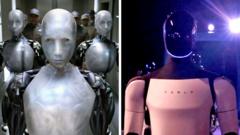Alex Proyas, the director of the 2004 sci-fi film "I, Robot," has recently voiced accusations against billionaire entrepreneur Elon Musk, claiming that Musk's latest technological innovations showcase designs similar to those in Proyas's film. At a Tesla event, Musk unveiled the Cybercab, a futuristic vehicle featuring winged doors and an absence of steering mechanisms, alongside a fresh presentation of Tesla's Optimus robots. Dubbed "We, Robot," after the works of Isaac Asimov, the showcase seems to parallel the thematic elements of Proyas's film starring Will Smith, where androids serve as obedient yet suspicious entities.
Proyas took to social media platform X—formerly known as Twitter—to express his concerns, which gained significant attention, viewing Elon Musk's creations as a reflection of his own cinematic efforts. Reflecting a persisting discussion, Proyas stated that while his film benefited from a "very talented design team," Musk's team seemed to have drawn upon pre-existing visual narratives, like those in "I, Robot."
Patrick Tatopoulos, the production designer from "I, Robot," added to the commentary by juxtaposing images from the film with those seen at Tesla's event, humorously questioning whether he should be flattered by the apparent homage. However, Proyas's claims were met with skepticism across the internet, with dissenters arguing the film itself borrows from earlier sci-fi works such as Fritz Lang's 1927 classic "Metropolis."
This isn't the first instance of tech moguls allegedly taking cues from the science fiction genre. Musk has identified Douglas Adams' "The Hitchhiker's Guide to the Galaxy" as a significant influence, leading to projects such as the Marvin-inspired AI chatbot Grok. Similarly, Tesla's Cybertruck drew comparisons to the dystopian aesthetics of "Blade Runner."
In a broader dialogue around technological innovation and pop culture influence, OpenAI's CEO Sam Altman addressed similar allegations when acknowledging the likeness between ChatGPT's "Sky" voice and a character from "Her," despite resulting in negative feedback and withdrawal from the market. While Proyas remains steadfast in his views, the intersection between sci-fi and technology continues to provoke debate, challenging the boundary between inspiration and imitation.
Proyas took to social media platform X—formerly known as Twitter—to express his concerns, which gained significant attention, viewing Elon Musk's creations as a reflection of his own cinematic efforts. Reflecting a persisting discussion, Proyas stated that while his film benefited from a "very talented design team," Musk's team seemed to have drawn upon pre-existing visual narratives, like those in "I, Robot."
Patrick Tatopoulos, the production designer from "I, Robot," added to the commentary by juxtaposing images from the film with those seen at Tesla's event, humorously questioning whether he should be flattered by the apparent homage. However, Proyas's claims were met with skepticism across the internet, with dissenters arguing the film itself borrows from earlier sci-fi works such as Fritz Lang's 1927 classic "Metropolis."
This isn't the first instance of tech moguls allegedly taking cues from the science fiction genre. Musk has identified Douglas Adams' "The Hitchhiker's Guide to the Galaxy" as a significant influence, leading to projects such as the Marvin-inspired AI chatbot Grok. Similarly, Tesla's Cybertruck drew comparisons to the dystopian aesthetics of "Blade Runner."
In a broader dialogue around technological innovation and pop culture influence, OpenAI's CEO Sam Altman addressed similar allegations when acknowledging the likeness between ChatGPT's "Sky" voice and a character from "Her," despite resulting in negative feedback and withdrawal from the market. While Proyas remains steadfast in his views, the intersection between sci-fi and technology continues to provoke debate, challenging the boundary between inspiration and imitation.




















